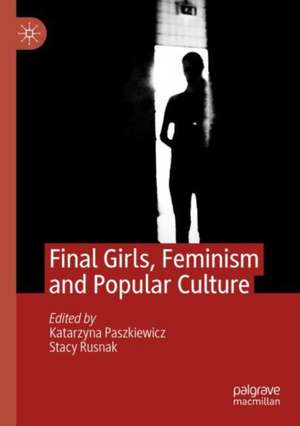Final Girls, Feminism and Popular Culture
Editat de Katarzyna Paszkiewicz, Stacy Rusnaken Limba Engleză Paperback – 26 aug 2021
| Toate formatele și edițiile | Preț | Express |
|---|---|---|
| Paperback (1) | 778.94 lei 6-8 săpt. | |
| Springer International Publishing – 26 aug 2021 | 778.94 lei 6-8 săpt. | |
| Hardback (1) | 784.13 lei 6-8 săpt. | |
| Springer International Publishing – 6 mai 2020 | 784.13 lei 6-8 săpt. |
Preț: 778.94 lei
Preț vechi: 949.94 lei
-18% Nou
Puncte Express: 1168
Preț estimativ în valută:
149.10€ • 162.01$ • 125.32£
149.10€ • 162.01$ • 125.32£
Carte tipărită la comandă
Livrare economică 21 aprilie-05 mai
Preluare comenzi: 021 569.72.76
Specificații
ISBN-13: 9783030315252
ISBN-10: 3030315258
Pagini: 281
Ilustrații: XIV, 281 p. 27 illus.
Dimensiuni: 148 x 210 mm
Greutate: 0.35 kg
Ediția:1st ed. 2020
Editura: Springer International Publishing
Colecția Palgrave Macmillan
Locul publicării:Cham, Switzerland
ISBN-10: 3030315258
Pagini: 281
Ilustrații: XIV, 281 p. 27 illus.
Dimensiuni: 148 x 210 mm
Greutate: 0.35 kg
Ediția:1st ed. 2020
Editura: Springer International Publishing
Colecția Palgrave Macmillan
Locul publicării:Cham, Switzerland
Cuprins
1 Introduction: Reimagining the Final Girl in the 21st Century.- Katarzyna Paszkiewicz and Stacy Rusnak.- SECTION 1.- From Slasher Films to Slasher TV Series.- 2 ‘People Call Me a Final Girl, But We’re All Final Girls in Lakewood’: Female Survivor(s) in Scream: The TV Series.- Isabel Clúa.- 3 The Final Girl(s): Queerness, Normativity and Survival in Scream Queens.- Peter Marra.- SECTION 2.- The Final Girl(s) in Horror Film.- 4 Who Are We? Queering the Final Girl in Alexandre Aja’s High Tension (2003).- Rebecca Willoughby.- 5 Get Out: Moral Monsters at the Intersection of Racism and the Horror Film.- Isabel Pinedo.- 6 The Slasher Film and the Final Girl Get Makeovers: It Follows and the Politics of Fourth Wave Feminism.- Stacy Rusnak.- 7 ‘Wouldst Thou Like to Live Deliciously?’: Gothic Feminism and the Final Girl in Robert Eggers’ The Witch(2015).- Vicki Madden.- SECTION 3.- The Final Girl(s) Beyond the Horror Genre.- 8 Sinister Power Play and the Final Girl: Katniss Everdeen in Suzanne Collin’s The Hunger Games Trilogy.- Sara Martín.- 9 Monstrous Final Girls: The Posthuman Body in Paolo Bacigalupi’s The Windup Girl and M.R. Carey’s The Girl with All the Gifts.- Isabel Santaulària.- 10 Other Girl Powers: Final Girls, Super Girls and Kamala Khan’s Ms. Marvel.- Andrea Ruthven.- SECTION 4.- Ways of Seeing: The Final Girl(s) and Spectatorship.- 11 The Final Girl in the Red Dress: Ways of Moving in the Resident Evil Films.- Steven Rybin.- 12 ‘What Were We – Idiots?’: Re-evaluating Female Spectatorship and the New Horror Heroine with Catherine Hardwicke’s Twilight (2008).- Angie Fazekas and Dan Vena.- 13 ‘Just Keep Looking Forward or We’ll Be Stuck Here Forever’: The Final Girls (2015), Spectatorial Address and Transformations of the Slasher Form.- Katarzyna Paszkiewicz.
Recenzii
“Final Girls, Feminism and Popular Culture fulfils its promise of providing a multidisciplinary and intersectional approach to theFinal Girl trope. Each chapter’s unique approach and discussion of widely different genres ensures its relevance for scholars interested in media, gender and reception studies, while its understanding of feminism as an organic continuum helps to both illuminate and question the achievements of our current sociopolitical context.” (nexus, aedean.org, Issue 2, 2020)
Notă biografică
Katarzyna Paszkiewicz is Lecturer in English Studies at the University of the Balearic Islands, Spain, and member of ADHUC–Research Center for Theory, Gender and Sexuality (University of Barcelona). She has co-edited, with Mary Harrod, Women Do Genre in Film and Television (2017, Winner of first Prize in the BAFTSS Best Edited Collection competition) and published her monograph Genre, Authorship and Contemporary Women Filmmakers (2018).
Stacy Rusnak is Associate Professor of Film at Georgia Gwinnett College, Georgia. Her publications include chapters on MTV and the 1980s satanic panic, cannibalism and consumption in Jorge Michel Grau’s Somos lo que hay and third wave feminism in Twin Peaks. She has also served as guest judge for Atlanta’s Buried Alive Film Festival.
Stacy Rusnak is Associate Professor of Film at Georgia Gwinnett College, Georgia. Her publications include chapters on MTV and the 1980s satanic panic, cannibalism and consumption in Jorge Michel Grau’s Somos lo que hay and third wave feminism in Twin Peaks. She has also served as guest judge for Atlanta’s Buried Alive Film Festival.
Textul de pe ultima copertă
This volume examines contemporary reformulations of the ‘Final Girl’ in film, TV, literature and comic, expanding the discussion of the trope beyond the slasher subgenre. Focusing specifically on popular texts that emerged in the 21st century, the volume asks: What is the sociocultural context that facilitated the remarkable proliferation of the Final Girls? What kinds of stories are told in these narratives and can they help us make sense of feminism? What are the roles of literature and media in the reconsiderations of Carol J. Clover’s term of thirty years ago and how does this term continue to inform our understanding of popular culture? The contributors to this collection take up these concerns from diverse perspectives and with different answers, notably spanning theories of genre, posthumanism, gender, sexuality and race, as well as audience reception and spectatorship.
Caracteristici
Becomes the first work to shed light on contemporary reformulations of the 'Final Girl' in film, TV and literature, focusing specifically on popular texts representative of the 21st century Stands apart in its expansion of the discussion of the ‘Final Girl’ beyond the traditional ruminations of the slasher subgenre in order to challenge previous approaches and offer innovative perspectives The contributors to this collection take up these concerns from diverse perspectives and with different answers, notably spanning theories of genre, posthumanism, gender, sexuality and race, as well as identification and spectatorship.
